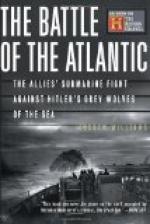“He is a danger, of course, but not a serious one,” I said confidently. “It is safe enough to leave him undisturbed at present with Cole on guard. The first thing I need do is to satisfy those men. I’ll attend to that now, and then see to the proper securing of Sanchez.”
“Shall I remain here?”
“You told the man Cole what you heard?”
“Yes, I explained everything to him before I came on deck.”
“Then you are not needed in the cabin. He is a reliable man. Remain here with LeVere while I go forward, and watch that he does not attempt to go below.”
The fellows had not finished mess, but I felt the danger of further delay, and talked to them as they sat on deck, explaining briefly the entire situation, and the causes leading up to the mutiny. I dealt with the matter in plain terms, making no apparent effort to influence them, yet forcibly compelling each individual to realize what would be the result of our recapture. They listened earnestly, asking an occasional question, and passing comments back and forth freely among themselves.
I shall never forget that scene, the decks already wet with fog, which swirled about us in an impenetrable cloud of vapor, utterly blotting out the sea, and even rendering our faces strange and indistinct. The foremast disappeared at the lower fore-yard, while aft of the cook’s galley the bark was entirely invisible. We rolled heavily in the swell of the heaving water, barely retaining steerage-way, the closely reefed sails aloft flapping against the masts, the straining deck beams creaking noisily to every roll of the vessel. The sailors stared up at me, rough dressed and hairy, yet not a bad-looking lot as sailors go, but with here and there a face to be distrusted. I sent Watkins to the cabin for a roll of charts, and spreading these out, endeavored as well as I could, to make clear our probable position and the nearest point of land. This was largely guesswork, but I approximated distances and made the situation fairly clear. When I had completed the explanation, and stood before them awaiting decision, it was Haines who acted as their spokesman.
“This yere is Cape Howarth?” he asked, a grimy thumb on the point indicated. “An’ yer say it’s ’bout a hundred and fifty miles west?”
“Yes, about that.”
“An’ thar’s no settlement?”
“Some colonists fifty miles north is all.” “That’s ’bout right.” He turned to the others. “Say mates, this is how I figure. We can’t go on no long cruise with all those bloody rats in the hold. They’re bound ter find some way out if we give ’em time ’nough. Fer as I’m concerned, I’m fer dividin’ up whut we’ve got, and ter hell with piratin’. What ‘er yer say, mates? Shall we run the ol’ hooker ashore, an’ leave her thar, while we tramp the coast? We’re just a ship-wrecked crew.”
“What ’bout them fellers down below?”
“Ter hell with ’em! Let ’em take keer o’ ’emselves. Thet’s the way they’d treat us.”




